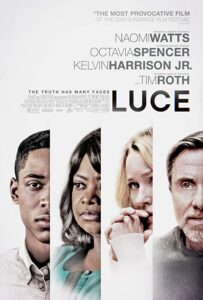Fine performances and provocative questions highlight simmering suburban thriller.


Luce Edgar (Kelvin Harrison, Jr.) is the perfect son. A star athlete and straight-A student, he’s on his way to realizing the American dream. Adopted by Amy and Peter (Naomi Watts and Tim Roth) from a war-torn nation where he was a child soldier, the struggle to normalize Luce has been relatively without incident. But when history teacher Harriet Wilson (Octavia Spencer) notices some disturbing material in a paper, she calls Amy in for a parent/teacher conference. Are Harriet’s concerns valid? Or is she overreacting?
Director Julius Onah (“The Cloverfield Paradox”) co-writes with playwright J. C. Lee, who adapts his stage play. The result is an experiment in perspective. As Harriet’s accusations hit hard, the Edgar’s become ever more entrenched, and Luce guards his secrets. The lack of communication on display is frustrating, but the script smartly holds back, which deepens the mystery.

Any parent who has sat with a teacher and been lectured to about their child’s performance or lack of performance will immediately see themselves in Amy and Peter. However, not all teachers are heavy-handed, and in fact, more often than not, it is the teacher that sees what the loving parents cannot. If there is a failing in “Luce,” it is in not making Harriet more reasonable. Without spoiling the story, things begin to unravel as Harriet pushes more and more into Luce’s life, questioning almost everything he says and does. Race is clearly a factor, but given Luce’s background, there is the nature versus nurture question floating about. Can the killer that he once was ever go away?

Without giving us critical details about Luce’s origin, the audience is left to speculate. There are subtle lines of dialogue that hint at his training as a young boy. And Amy admits that it was their responsibility to mainstream the child. At one point, Peter bemoans the fact that he wanted a child, not a cause. This points out the idea that maybe the responsibility wasn’t to pull a child out of his or her country of origin and make the child one of us. Rather, maybe it is our responsibility to help that child’s nation move away from war and not contribute to the brain drain. A lot rests on Luce’s young shoulders, but the focus of school officials is on investigating where the fireworks in his locker came from.
A film like “Luce” introduces provocative questions, and it is too much for that same film to provide complex answers. If the closing act is a little manipulative, that is the consequence of the restrictions of the feature film running time. This makes “Luce” feel like a pilot episode for a series that you’d see on HBO.

And, in fact, the similarities to HBO’s “Euphoria” are hard to discount. Kids today have more information available to them than ever before. Figuring out how to get high, what type of sex to engage in, how to write the perfect term paper, how to play Fortnite and make a million are out there on the web in an overwhelming number of variations. And that information is often corrupted with so many half-truths and out-and-out falsehoods. No wonder that some of our young people are become radicalized.
We know the problems, because they are all around us, prioritizing which ones to address first is the key. And that starts with opening our eyes, ears and hearts. Cynically, I guess I’ll take Joe Biden’s advice and Google it. A film like “Luce” has its heart exposed, raising the questions and beckoning us to search for the solutions.
